Benefits of eating sesame seeds plus potential risks and side effects
Sesame seeds – those tiny seeds that you may encounter on hamburger buns, bagels, or on sushi rolls are some of the healthiest seeds used by mankind for centuries. Rich in protein, fiber, healthy fat, antioxidants they are a healthy addition to your meals.
Here you can find out why sesame seeds are so good for you, the possible side effects of eating too much, and the best ways to add them into your diet.
Interesting facts about sesame
- Sesame seeds are very small, to get 100 grams you need 500 seeds
- 75% of Mexican sesame production is bought by McDonald’s only
- In European and Caribbean cuisine white sesame seeds and sugar are combined into a bar resembling brittle
- Top producing country are China, Myanmar, India, Sudan, Uganda, Tanzania
- Japan is the world’s larger sesame importer
This post may contain affiliate links, which means we may receive a small commission, at no cost to you, if you make a purchase through a link. For more information, please see our disclosure.
What are sesame seeds?
Sesame seeds are tiny edible seeds that grow in pods on a plant called Sesamum indicum. These are probably one of the first oil seeds known to mankind and have been cultivated for more than 3,500 years.
Unhulled seeds have the outer edible husk intact, while hulled seeds come without the husk. The hull gives the seeds a golden-brown hue, hulled seeds have an off-white color but turn brown when roasted.
There are two types of sesame seeds: shattering varieties, which are for consumption; and nonshattering varieties, which are used solely for sesame oil production.
Sesame oil extracted from the sesame seeds has a higher smoke point, 350-450 degrees depending on whether is refined or unrefined, which makes it a great option for cooking.
The seeds come in a wide variety of colors depending on the variety or strain of the sesame plant, such as white, black sesame seeds, and brown seeds. White sesame seeds are hulled, while the brown and black ones retain their hulls.
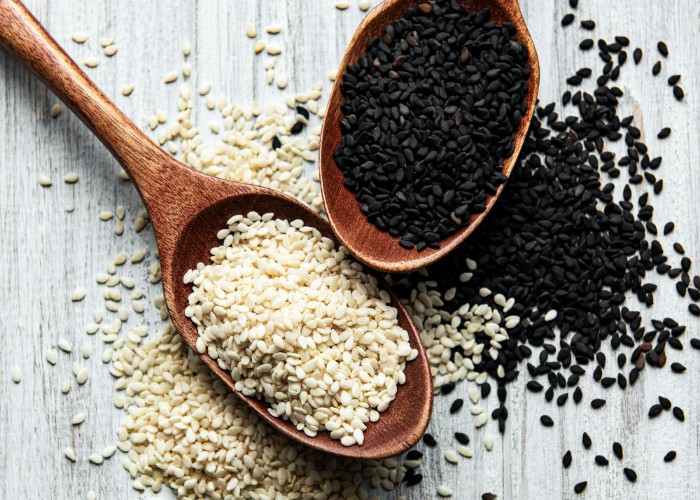
White sesame seeds have higher iron content and are mostly used as ingredients in food or in the form of oil. On the other hand, black sesame seeds are more flavorful, have a stronger aroma, and are preferably used in medicine. They contain 60% more calcium than the white ones.
Nutrition value of sesame seeds
According to USDA sesame seeds are a rich source of natural oils, antioxidants, dietary fiber, protein, and vitamins and minerals like magnesium, calcium, iron, phosphorus, B vitamins, and vitamin E.
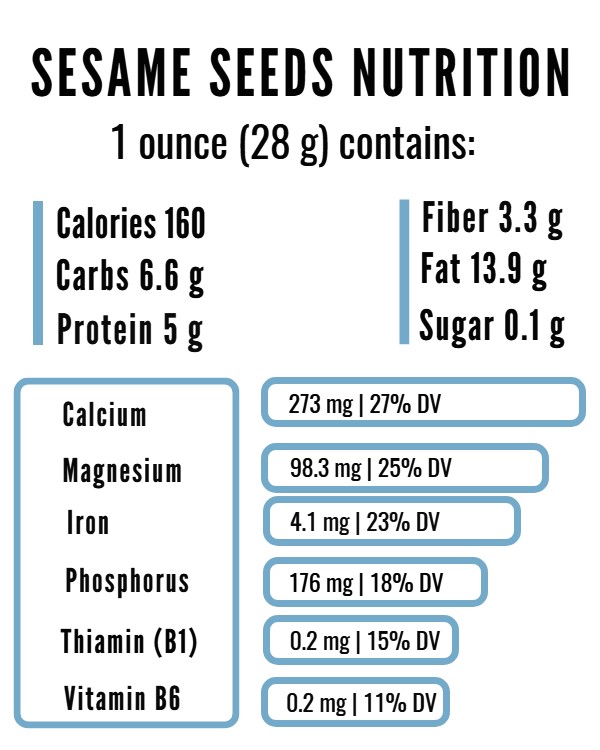
Also, these seeds are packed with fat-burning polyphenols like sesamin and sesamol. Sesame seeds supply 5 grams of protein per 3 tablespoons serving. To maximize protein availability go for hulled, roasted seeds. The roasting and hulling process reduces oxalates and phytates, compounds that obstruct your digestion and absorption of protein.
B vitamins – Sesame seeds are good for you because they are a great source of B vitamins and our bodies can’t store most B vitamins, so we need to get B vitamins regularly from the diet. They are essential because they turn the nutrients from food into energy that the body can use.
Antioxidants – The lignans in sesame seeds function as antioxidants, which help fight oxidative stress. Additionally, sesame seeds contain a form of Vitamin E called gamma-tocopherol that may be especially protective against heart disease.
Fiber – The average fiber intake in the United States is only half of the RDI, adding sesame seeds into your diet can help increase your fiber intake. Fiber is well known for supporting digestive health and just 3 tablespoons of sesame seeds provide 12% of the Reference Daily Intake of fiber.
According to these nutrition facts for sesame seeds, we can expect that eating them can be very beneficial for our health. Now, let’s see why sesame seeds are good for you and we will back up that with scientific evidence.
Are sesame seeds good for you?
A number of studies have assessed sesame and the results from these studies showed how incorporating sesame seeds in your diet is beneficial for your health and why these tiny seeds are so good for you. So, here are the main sesame seeds benefits according to science:
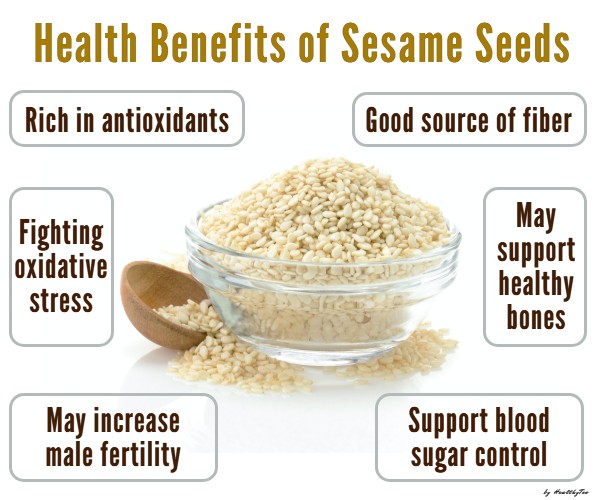
Lowering cholesterol
According to many studies eating more polyunsaturated and monosaturated fat relative to saturated fat may help lower cholesterol and reduce heart disease risk. Sesame seeds consist of 41% polyunsaturated fat, 39% monounsaturated fat, and only 15% saturated fat.
They also contain two types of plant compounds lignans and phytosterols that may also have a cholesterol-lowering effect.
A study published in the International Journal Of Food Science and Nutrition in 2012, found that consuming white sesame seeds, 1.5 ounces a day (42 grams) for 60 days produced a comparable reduction in people with high cholesterol levels.
Reducing blood pressure
Sesame seeds have a good amount of magnesium which may help lower blood pressure. Also, vitamin E, lignans, and other antioxidants in the seeds may help prevent plaque buildup in arteries, potentially maintaining blood pressure.
In a small study published in the Nutritional Journal, people with high blood pressure who consumed 2.5 grams of a black sesame seed ( in capsules ) for four weeks had a significant 6% decrease in systolic blood pressure compared to the placebo group.
May support healthy bones
Unhulled and hulled sesame seeds are rich in several impressive minerals like zinc, calcium, and phosphorus that boost bone health. These minerals are integral parts in creating new bone matter and strengthening and repairing bones weakened by injury.
When it comes to calcium content 3 tablespoons ( 30 grams ) of unhulled sesame seeds give 22% of the RDI and hulled 1% of the RDI. Calcium is mainly present in the hull.
Also, it is good to know that sesame contains natural compounds called oxalates and phytates (antinutrients that reduce the absorption of minerals).To limit these compound’s impact try roasting, soaking, or sprouting the seeds.
Support blood sugar control
Low in carbs and high in healthy fats and protein, sesame seeds may support blood sugar control. In a small study from 2011, people with type 2 diabetes were given sesame oil, diabetes medications, or both. The greatest blood sugar reduction occurred in those in the combination group.
This result led the researchers to conclude that the oil has a “synergetic effect” with medication. It improves the medication’s functionality and regulates the insulin and glucose levels in the body. This process helps to manage the process of diabetes.
Increases male fertility
This is another benefit of eating sesame seeds, especially for men. Sesame seeds when added to the diet of men increases male fertility and improves sperm quality. This is supported by a study published in the Journal of Research in Medical Science.
In this study participated 25 infertile men. They were treated with a 3-months course of taking 0.5 mg/kg sesame. The results showed that sesame improved sperm count and motility, and that sesame is effective for male factor infertility.
Fighting oxidative stress
Sesame seeds raise blood levels of antioxidants including vitamin E and enzymes like glutathione peroxidase that protect against oxidative damage. There aren’t many studies about this effect of sesame but there is an analysis published in the Journal of Medicinal Food.
This analysis of clinical trials shows that sesame seeds reduce markers of oxidative stress among people with diabetes, hypertension, and high cholesterol.
Summing up: This is why sesame seeds are good for you. What we’ve said here about the benefits of eating sesame seeds is based on science and evidence from different studies.
There are other benefits of sesame seeds like they may support thyroid health, reduce inflammation, may aid hormone balance during menopause, etc. But there aren’t enough studies to support these claims and more research needs to be done to prove such connections.
Potential risks and side effects
The side effects of sesame seeds are often associated with their allergies. According to the American Academy of Allergy, Asthma, and Immunology, sesame allergy is the ninth most common food allergy in the United States.
Sesame is currently not on the FDA list of major food allergens and food labels don’t have to list sesame as a separate ingredient. Sometimes it’s called by unfamiliar names like sesamol or gingelly, which also may refer to it as a “spice” or “natural flavoring“. As a result, people may come into contact with sesame without realizing it.
A sesame allergy can cause a severe allergic reaction and a person will need immediate medical attention if they have symptoms of severe allergic reaction which can include: swollen throat, a tight feeling in the chest, wheezing, difficulty breathing, flushed skin, feeling dizzy, nausea, vomiting, diarrhea.
Good to know: Many people treat sesame seeds as nuts. Sesame seeds aren’t nuts. The reason for this is the presence of similar allergenic proteins and chemicals that are also found in nuts. If you are allergic to some types of nuts you should speak with your doctor about sesame seeds.
Eating sesame seeds
Now when we’ve learned why sesame seeds are good for our body and that eating sesame seeds is very beneficial for our health it is time to see the best ways to incorporate these tiny edible seeds into our diet.
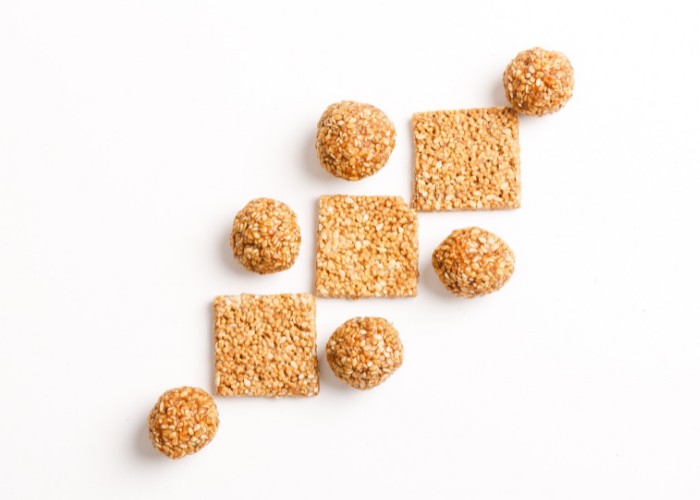
In North American and European cuisines sesame seeds are used as a garnish for savory dishes, bread, and pastries. South American, African, and Asian cuisines use sesame seeds in both sweet and savory dishes. The main use of sesame seeds is that they give a nutty flavor and are subtle to dishes.
Sesame seeds are gluten-free seeds that can be eaten raw or they can be baked or toasted to bring out more of their natural nutty flavor.
Roasting sesame seeds
To enhance the flavor and nutrient availability you should roast sesame seeds. This is a simple process, just spread them on a baking tray and place them in the oven for 5-10 minutes at 350 F (180 C).
Stirring through the seeds periodically will help ensure that they toast evenly and when they reach light golden brown color they are ready.
Sesame seeds can be used in a variety of ways, try adding them to:
- salads and salad dressings
- smoothies or yogurt
- bread and muffins
- stir-fries
- steamed broccoli
- granola and granola bars
- hot or cold cereals
Additionally, you can use a paste from sesame seeds called tahini. People use tahini as an ingredient in dips and sauces or stir it through dishes to add nutrition and flavor.
Tahini is vegan, gluten-free, tastes nutty, and is mostly used in Mediterranean and Middle East cuisines. You can make your own tahini or purchase here this organic non-GMO tahini sesame seed butter perfect for plant-based, paleo, and vegan diets.
Sesame flour or sesame meal made by grounding sesame seeds also can be used in baking, fish batter, smoothies, and more.
As we can see there are many ways to add sesame seeds to your diet and we are sure that you already use them. It’s up to you how will you incorporate them into your daily diet but be sure to use them because you don’t want to miss all the benefits that come with them.
How many sesame seeds per day?
Sesame seeds are nutrient-dense so you don’t need to eat too many to reap the benefits. The recommended dosage of sesame seeds is 1-2 tablespoons once a day. Raw or toasted? Toasted sesame seeds are better, toasting makes them crunchier and can enhance their flavor.
Common question and answers
Q: Are sesame seeds nuts?
A: Many people with nut allergies wondering if they can enjoy sesame seeds. The simple answer is they are not tree nuts. They come from a plant that is not related to nut-producing trees.
Be aware that certain proteins in sesame seeds can trigger allergy symptoms related to a nut allergy. Your allergist is the best source for advice if on whether seeds are an appropriate part of your diet, especially if you have other food allergies.
Q: Can dogs have sesame seeds?
A: Sesame seeds are generally considered to be safe for dogs to eat. It’s not clear whether dogs can digest the seeds to absorb the nutrients. There are no cases of toxicity from dogs eating these seeds so they are not poisonous to dogs.
Q: What is the difference between white and black sesame seeds?
A: Black sesame seeds are not hulled, whereas white sesame seeds are hulled – their outer shell (hull) is removed. There is a little taste difference between these two seeds. Black sesame seeds are slightly bitter in taste while white sesame seeds are nuttier in flavor.
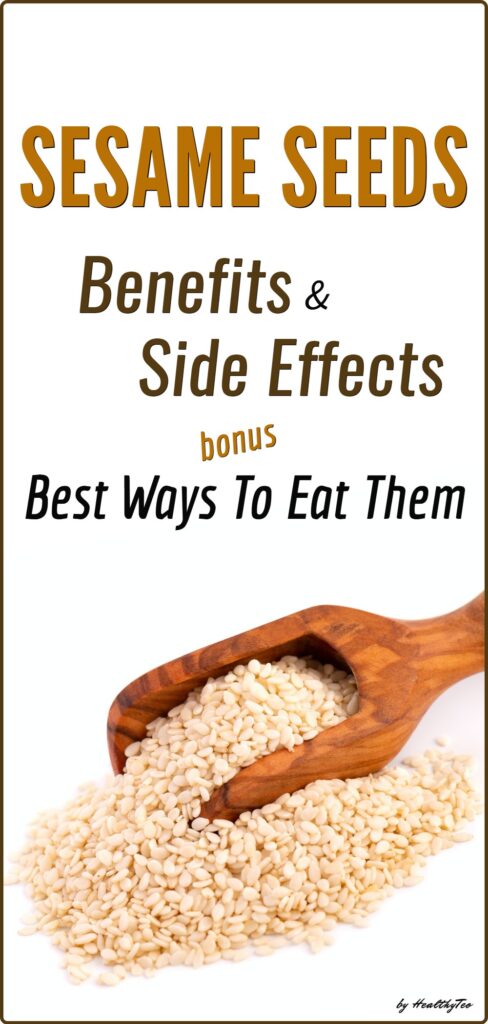
Sesame seeds benefits and side effects – final thoughts
These tiny but so healthy seeds are an excellent source of healthy fat, fiber, protein, antioxidants, and other beneficial plant compounds. Regularly consuming them may help lower cholesterol, may support blood sugar control, increase male fertility, fight oxidative stress.
Sesame seeds are so easy to add to your diet. You can eat them raw or toasted, and it’s so easy to sprinkle onto dishes. Also, you can use sesame oil or tahini in a variety of recipes.
One important thing that you should be aware of is sesame allergy. People with a sesame allergy should avoid all products containing sesame in any form, sesame oil, sesame seeds, tahini, etc.
These are super healthy seeds, if you don’t have a problem with sesame allergy don’t hesitate to add them to your daily diet.
Further reading:
- Different Types Of Edible Seeds That You Should Add Into Your Diet
- Benefits of Black Sesame Seeds and How to Incorporate Them Into Your Diet




